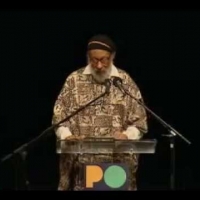On May 6, 2015 3:46 AM, "Vladimir Lucien" wrote:
For Kamau and all: a little rundown of those who weren't there about the Brathwaite tribute and the Walcott VS Brathwaite panel [last week at Bocas]:

On May 6, 2015 3:46 AM, "Vladimir Lucien" wrote:
For Kamau and all: a little rundown of those who weren't there about the Brathwaite tribute and the Walcott VS Brathwaite panel [last week at Bocas]:
KAMAU PLAYED A crucial role in returning me to myself, so to speak. I’d left Jamaica at age nine for Barbados. We are both—though of different eras—alumni of Harrison College. After Barbados, I spent five years at an English public (i.e., private) school. I was an outsider there, of course, though I enjoyed the experience, and England.
H Nigel Thomas:
Some of your poems interrogate the way Western languages have sullied Blackness. I wonder whether you would like to comment on this.
THE TIME WAS the summer of 1991. Kamau said to me, “Where are those Guanahani poems?” The place was the English Department of the University of Miami. Kamau was the Poetry Director for the Caribbean Writers Summer Institute.
I was one of several persons attending the Institute and definitely one of the beginner writers in a workshop of established and published writers such as Zee Edgell, Velma Pollard, Michael Anthony, Robert Antoni, to name a few. I was extraordinarily nervous and lacking in confidence in this setting.
WES HALL, THE fastest fast bowler, 6'4", strong, loud, is beginning to totter. He says it is because of his accident. No doubt. Derek Walcott rides a wheelchair—the man people and his poetry said was a lover, possibly a rake. George Lamming, well, he totters, too. I saw him drop a book, and though he possibly could pick it up, I saw the relief, surreptitious and possibly angry, too, when she, young and supple, did instead. Tom Clarke curses that he has to sit when the young one offers him a seat in the bus. He'd rather not be seen to need a hand up of that kind. Well, I am 61, and i
It is as if there is a shadow
of something whole
interrupting the relentless clouds
of snow swirling about us,
and suddenly, the dark body
of steel, wood, and canvas,
sailing through with the warm laughter
of a singing troupe drunk
with careless delight,
becomes everything in the world.
This is how the news
that Kamau Brathwaite had won
the medal named after that tricky,
tricky New Hampshire poet,
who sardonically goaded
his earnest best friend to war,
Kamau Brathwaite (right) and Marguerite Laurent, attorney and performance artist. The Haitian-American legal activist met Kamau at the St Martin Book Fair in 2006. In background are St Martin poets/authors Drisana Deborah Jack (left) and Changa Hickinson. (Photo © 2015 House of Nehesi Publishers)
Kamau Brathwaite's Words Need Love Too (House of Nehesi Publishers, 2000) was called "a felicitous example of the publication of a major Caribbean writer at home" by Elaine Savory in the Harvard University journal Transition (2008).
THE STATE OF exile is another theme that predominates West Indian writing, and it certainly permeates Kamau Brathwaite’s poetry. In the poem “Postlude/Home,” the poet poses a series of questions about the Black man’s place in the African Diaspora. These questions link the theme of exile to those of dispossession and deracination:
What guilt
now drives him on?
Will exile never
end?
The memories
are cold.